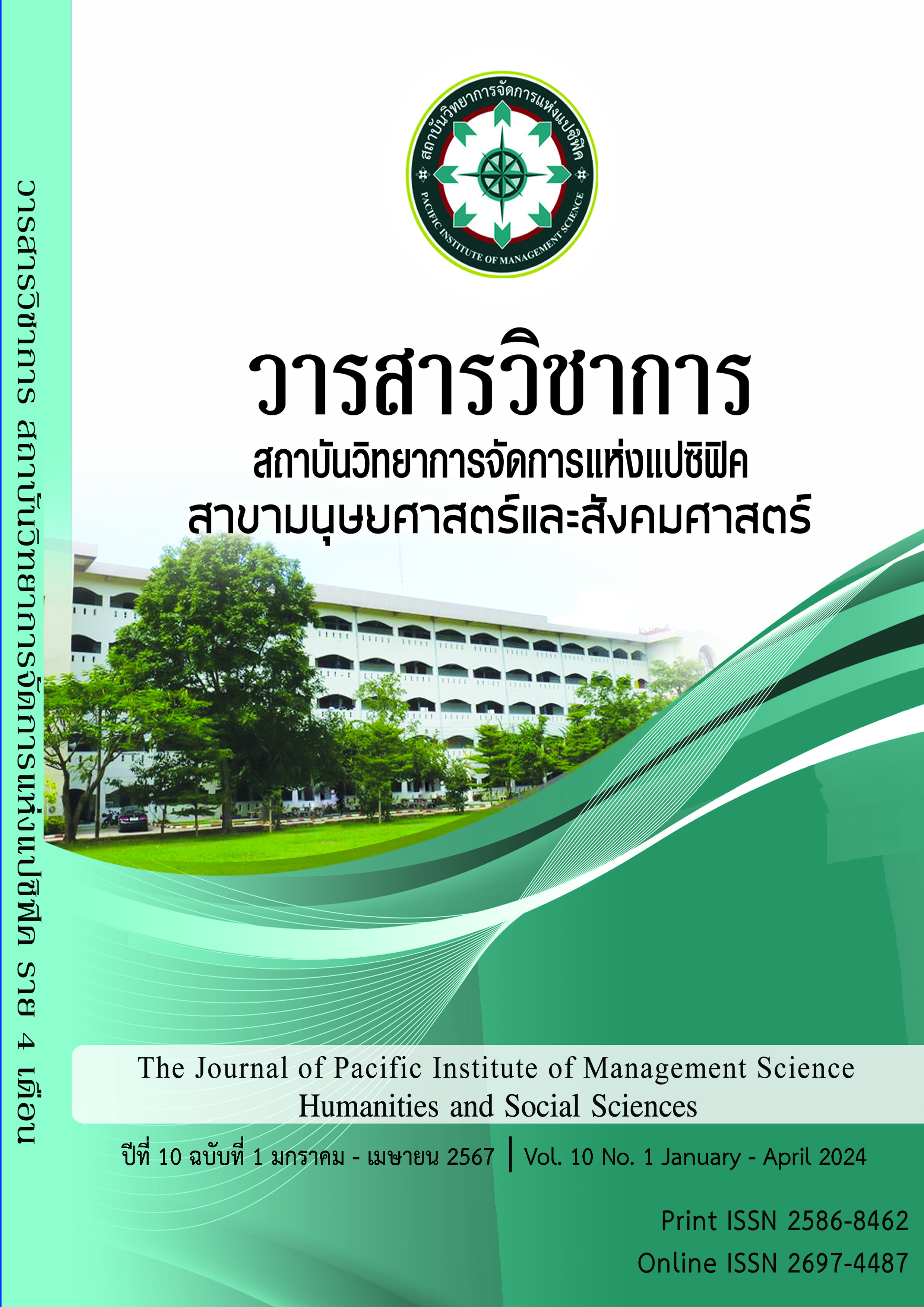Guidelines for developing the quality of life and environment of communities in Bangkok According to strategy 2
Keywords:
Quidelines for developing, quality of life development, community development, the quality of life and environmentAbstract
The objectives of this research were: 1) to study the level of opinions of the community on the development of the quality of life and the environment in Bangkok; 2) to study and compare the opinions of the community on the development of the quality of life and the environment in Bangkok, Classified according to demographic characteristics and 3) to find ways to develop the quality of life and environment of communities in Bangkok. Integrated research model use the concept of quality of life development as the research framework. The research area are 8 districts in Bangkok. The sample group has 2 types: Type 1, where the main informants are community presidents or community committee members in Bangkok, totaling 8 people, and Type 2, 400 people in the area, using simple random sampling. Research tools are 1) questionnaire 2) interview form. Data were analyzed using frequency, percentage, mean and standard deviation. Qualitative research section Analyze the content and write a descriptive narrative. The results of the research found that 1) The level of opinions regarding the development of the quality of life and environment in Bangkok in all aspects is at a high level. 2) The development of the quality of life of the people in Bangkok. There is a high level of opinion regarding the quality of life of the people in the community in Bangkok in every aspect. 3) Summary of the hypothesis that people in the Bangkok community of different genders have a level of development of the quality of life and the environment different Significantly at 0.05. As for people in the Bangkok community with different ages, marital status, education level, occupation, and average monthly income, they have different statuses.
References
กาจพงษ์ ทองธวัช. (2540). คุณภาพชีวิตของพนักงานในโรงงานอุตสาหกรรม: ศึกษานิคมอุตสาหกรรม บางปู. ภาคนิพนธ์ปริญญาศิลปศาสตรมหาบัณฑิต, มหาวิทยาลัยเกริก.
กัลยา วานิชย์บัญชา. (2555). การใช้ SPSS for Windows ในการวิเคราะห์ข้อมูล. พิมพ์ครั้งที่ 20 กรุงเทพมหานคร : โรงพิมพ์จุฬาลงกรณ์มหาวิทยาลัย
เกษม จันทร์แก้ว. (2540). วิทยาศาสตร์สิ่งแวดล้อม. กรุงเทพมหานคร : มหาวิทยาลัยเกษตรศาสตร์.
พระสมชาย จนฺทสาโร (ถนัดกิจตระกูล). (2562). บทบาทของผู้นำชุมชนกับการพัฒนาคุณภาพชีวิตในชุมชน สุขฤดี แขวงท่าแร้ง เขตบางเขน กรุงเทพมหานคร. วิทยานิพนธ์ปริญญาพุทธศาสตรมหาบัณฑิต สาขาวิชาการพัฒนาสังคม มหาวิทยาลัยมหาจุฬาลงกรณราชวิทยาลัย
ราชบัณฑิตยสถาน. (2554). พจนานุกรม ฉบับราชบัณฑิตยสถาน พ.ศ. 2554. กรุงเทพมหานคร : นานมีบุ๊คส์พับลิเคชั่นส์.
ราชบัณฑิตยสถาน. (2525). พจนานุกรม ฉบับราชบัณฑิตยสถาน พ.ศ. 2525. กรุงเทพมหานคร : นานมีบุ๊คส์พับลิเคชั่นส์.
รัฐธรรมนูญแห่งราชอาณาจักรไทย. (2560, เมษายน 6). ราชกิจจานุเบกษา, 134(40ก), 2560: 17-18.
สุชาติ ทะเลลึก. (2562). คุณภาพชีวิตของประชาชนในชุมชนพื้นที่เขตดอนเมือง กรุงเทพมหานคร. สารนิพนธ์ รัฐประศาสนศาสตรมหาบัณฑิต, มหาวิทยาลัยเกษมบัณฑิต.
อนรรฆ อิสเฮาะ (2562). คุณภาพชีวิตของประชาชนในเขตองค์การบริหารส่วนตําบลสะกอม อําเภอเทพา จังหวัดสงขลา. สารนิพนธ์ปริญญารัฐประศาสนศาสตรมหาบัณฑิต สาขาวิชารัฐประศาสนศาสตร์ มหาวิทยาลัยสงขลานครินทร์
Constitution. (2017, April 6). Government Gazette, 134(40k): 17-18. (in Thai)
Dean. (1985). Essential of Psychological Testing. 5th ed. New York: Harper
Ishoh. (2019). Quality of life of people in Tambon Sakom Administrative Organization, Thepha District, Songkhla Province. Prince of Songkla University, Songkhla. (in Thai)
Khokma, Y. & Ratchatapibhunphob, P. (2020). People’s quality of life in relation to community attachment at NamPad District, Uttaradit. SuanDusit Graduate School Academic Journal, 16(1): 191-209. (in Thai)
OECD. (2011). Thailand: Key Issues and Policies. OECD Studies on SMEs and Enterpreneurship. OECD Publishing.
Peace, S. M. (1990). Researching social gerontology: Concepts, methods, and issues. London: SAGE.
The WHOQOL Group. (1994). Development of the WHOQOL: Rationale and Current Status. International Journal of Mental Health, 23(3): 24-56.
UNESCO. (1981). Quality of life. An Orientation of Population Education. Bangkok: UNESCO
Downloads
Published
Issue
Section
License
Copyright (c) 2024 Pacific Institute of Management Science

This work is licensed under a Creative Commons Attribution-NonCommercial-NoDerivatives 4.0 International License.
บทความที่ได้รับการตีพิมพ์เป็นลิขสิทธิ์ของ สถาบันวิทยาการจัดการแห่งแปซิฟิค
ข้อความที่ปรากฏในบทความแต่ละเรื่องในวารสารวิชาการเล่มนี้เป็นความคิดเห็นส่วนตัวของผู้เขียนแต่ละท่านไม่เกี่ยวข้องกับสถาบันวิทยาการจัดการแห่งแปซิฟิค และคณาจารย์ท่านอื่นๆในสถาบันฯ แต่อย่างใด ความรับผิดชอบองค์ประกอบทั้งหมดของบทความแต่ละเรื่องเป็นของผู้เขียนแต่ละท่าน หากมีความผิดพลาดใดๆ ผู้เขียนแต่ละท่านจะรับผิดชอบบทความของตนเองแต่ผู้เดียว







